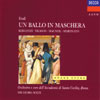Verdi Un ballo in maschera
View record and artist detailsRecord and Artist Details
Composer or Director: Giuseppe Verdi
Genre:
Opera
Label: Grand Opera
Magazine Review Date: 9/1990
Media Format: CD or Download
Media Runtime: 127
Mastering:
Stereo
ADD
Catalogue Number: 425 655-2DM2

Tracks:
| Composition | Artist Credit |
|---|---|
| (Un) ballo in maschera, '(A) masked ball' |
Giuseppe Verdi, Composer
Birgit Nilsson, Amelia, Soprano Carlo Bergonzi, Riccardo, Tenor Cornell MacNeil, Renato, Baritone Fernando Corena, Sam, Bass Georg Solti, Conductor Giulietta Simionato, Ulrica, Contralto (Female alto) Giuseppe Verdi, Composer Libero Arbace, Tom, Bass Piero de Palma, Judge, Tenor Santa Cecilia Academy Chorus, Rome Santa Cecilia Academy Orchestra, Rome Sylvia Stahlman, Oscar, Soprano Tom Krause, Silvano, Baritone Vittorio Pandano, Servant, Tenor |
Author: Alan Blyth
It would be hard, if not impossible today, to assemble such a secure-voiced and accomplished cast as this for Ballo, which is not to say it hasn't been tried, as in Karajan's Salzburg set of last year (DG). I suppose Solti himself came nearest to assembling a modern cast of similar amplitude in his 1985 Decca set, but that somehow hung fire. Here with singers well inside their roles he achieved a version that stands up reasonably well to the test of time. Nilsson, though not quite an idiomatic Verdian soprano, always aspired to be one. She sings with plenty of depth and understanding in a part she often took in Stockholm and displays, almost needless to say, a voice that is technically firm and secure. Bergonzi is about the best Riccardo on any complete commercial set: he achieves more character than Domingo, who sang this part in the above Karajan recording, as well as in sets for Abbado and Muti (DG and EMI respectively), and has an easier agility than Pavarotti, though on the later Solti, Pavarotti does run him close. Bergonzi's line, attack, pitch and characterization in one of his most telling parts, is an object-lesson in singing Verdi. MacNeil sings powerfully enough but lacks commitment. He is no rival for Bruson on the 1985 Solti and the Abbado versions, or Gobbi on the Votto (EMI—recorded in 1956). Simionato is an imposing Ulrica though her contemporary Barbieri (Votto), Cossotto (Muti) and Verrett, for Leinsdorf (RCA), are just as impressive. Stahlmann is a decent, though not special, Oscar.
However, I have never thought of this as Solti's opera. His jerky direction misses the natural sense of line and phrase exhibited by Muti, Abbado and Votto and he isn't inside the piece even as much as Leinsdorf on his rival mid-price and even better sung version. I also find the somewhat studio-bound sound worrying. This set was made when Decca favoured a recessed, over-reverberant orchestra. The fact that the performance sounds something less than through-recorded and spontaneous is explained by the unhappy circumstances under which it was made as described by John Culshaw in his revelatory volume Putting the Record Straight (London: 1981) Bjorling, the original Riccardo, was incapacitated through hubris and through imbibing too much, so all the music that includes Riccardo had to be recorded a year later than the rest, by which time the Swedish tenor was dead, and in any case Bergonzi had been brought in to replace him. Culshaw had to cope with the Bjorling trauma and may not have had his mind entirely on Ballo. For all that, this is a worthwhile performance at mid price if you want this particular configuration of splendid singers. As an absolute choice I would still opt for Votto (with Callas, Gobbi and di Stefano, unrivalled for dramatic conviction) or Muti—also at mid price.'
However, I have never thought of this as Solti's opera. His jerky direction misses the natural sense of line and phrase exhibited by Muti, Abbado and Votto and he isn't inside the piece even as much as Leinsdorf on his rival mid-price and even better sung version. I also find the somewhat studio-bound sound worrying. This set was made when Decca favoured a recessed, over-reverberant orchestra. The fact that the performance sounds something less than through-recorded and spontaneous is explained by the unhappy circumstances under which it was made as described by John Culshaw in his revelatory volume Putting the Record Straight (London: 1981) Bjorling, the original Riccardo, was incapacitated through hubris and through imbibing too much, so all the music that includes Riccardo had to be recorded a year later than the rest, by which time the Swedish tenor was dead, and in any case Bergonzi had been brought in to replace him. Culshaw had to cope with the Bjorling trauma and may not have had his mind entirely on Ballo. For all that, this is a worthwhile performance at mid price if you want this particular configuration of splendid singers. As an absolute choice I would still opt for Votto (with Callas, Gobbi and di Stefano, unrivalled for dramatic conviction) or Muti—also at mid price.'
Discover the world's largest classical music catalogue with Presto Music.

Gramophone Digital Club
- Digital Edition
- Digital Archive
- Reviews Database
- Full website access
From £8.75 / month
Subscribe
Gramophone Full Club
- Print Edition
- Digital Edition
- Digital Archive
- Reviews Database
- Full website access
From £11.00 / month
Subscribe
If you are a library, university or other organisation that would be interested in an institutional subscription to Gramophone please click here for further information.




